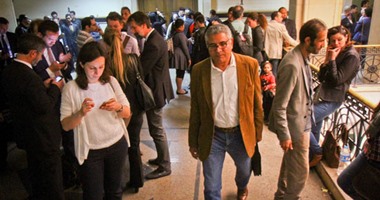 The undersigned organizations strongly condemn the escalating measures taken against independent human rights organizations. In a new development, the investigating judge in case 173/2011, known as the foreign funding case, summoned Rawda Ahmed, an attorney with the Arabic Network for Human Rights Information (ANHRI), for questioning at 11 am, Thursday, May 26, 2016. This comes three days after a felony court continued proceedings to hear a petition filed by the investigating judges in the case asking for an asset freeze for five directors and founders of independent rights groups.
The undersigned organizations strongly condemn the escalating measures taken against independent human rights organizations. In a new development, the investigating judge in case 173/2011, known as the foreign funding case, summoned Rawda Ahmed, an attorney with the Arabic Network for Human Rights Information (ANHRI), for questioning at 11 am, Thursday, May 26, 2016. This comes three days after a felony court continued proceedings to hear a petition filed by the investigating judges in the case asking for an asset freeze for five directors and founders of independent rights groups.
Lawyer Rawda Ahmed received a phone call asking her to come to the office of the judge investigating the foreign funding case. When several attorneys went to the office to confirm the call, they were officially notified that Ms. Ahmed had been summoned for questioning on May 26.
The summons is the first official summons of a lawyer at the ANHRI, although it has been preceded by summons for questioning of other staff members at various independent rights groups, including the Cairo Institute for Human Rights Information, Nazra for Feminist Studies, and the Andalus Center for Tolerance and Anti-Violence Studies, in connection with the same case. In addition, a lawyer with the law firm United Group has also been called in for questioning.
In the same context, a felony court on May 23 convened to consider the asset freeze order in connection with the same case, issued against five directors and founders of independent rights groups: Hossam Bahgat; Gamal Eid, along with his wife and minor daughter; Bahey eldin Hassan, the director of the CIHRS, as well as his wife, daughters, and two CIHRS staff members; Abd al-Hafiz Tayel, the director of the Egyptian Center for the Right to Education; and Mustafa al-Hassan, the director of the Hisham Mubarak Law Center. The hearing was adjourned until July 17.
State agencies insist on dealing with rights organizations and the violations they expose with the same logic reflected in statements from the Egyptian Foreign Ministry. Commenting on the numerous human rights crimes committed by the government every day, the tenor of these statements is not commensurate with the gravity of the situation and refuses to recognize that there is a problem. Instead, these statements offer wan justifications and cite principles such as Egyptian sovereignty, non-interference in judicial affairs, and other laughable excuses for such abuses, indicating a complete disconnect from reality.
It is not only state agencies that minimize and dismiss concerns about citizens’ rights and liberties. The president himself uses the same logic. In a press conference with the French president a few weeks ago, in response to a journalist’s question about the state of human rights in Egypt, the president essentially responded that Egyptians were less human than Europeans, rejecting the idea of applying the same human rights standards in Europe and Egypt. In a subsequent address, he refused to consider civil liberties, specifically the freedom of thought and expression, as a priority for Egypt, reducing human rights to the right to health, work, and education.
Nevertheless, the foreign funding case now includes a center that defends the right to education, even as the state continues to crack down on independent trade unions that work to secure workers’ rights and provide professional, health, and economic services to them.
The undersigned organizations reiterate that the continued use of the foreign funding case to exact revenge against Egyptian civil society is helping annihilate the Egyptian rights movement and is seeking to eliminate civil society organizations, much like the international organizations that were forced to close their offices in the country, in one of the worst outcomes of the early stages of the case. Threatening rights advocates with death, prison, travel bans, or asset freezes will not reform society, eliminate terrorism, or realize genuine economic and social development. It will only silence the last remaining voice of victims, especially in light of the severe dysfunction of the justice system and the crimes of a security apparatus that is subject to no law or accountability.
Background on case 173/2011, the foreign funding case: imminent risk of prosecution and closure
Signatory organizations
- Arabic Network for Human Rights Information
- Association for Freedom of Thought and Expression
- Cairo Institute for Human Rights Studies
- Center for Egyptian Women’s Legal Assistance
- Egyptian Center for Economic and Social rights
- Hisham Mubarak Law Center
- Nadeem Center for the Rehabilitation of Victims of Violence and Torture
- National Group for Human Rights
Share this Post

